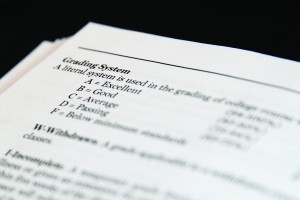The college has recently proposed a motion to relinquish the current grading scale in favor of a non-numerical rubric. The rubric would still retain quality points for determining GPA, but it would also establish value based on certain adjectives such as Excellent, Good, Average, etc. Each department would have the responsibility of maintaining grading criteria that are consistent across each discipline, the results of which would be funneled through the rubric.
 The decision stems from multiple sources, the principal cause being the results of a faculty survey taken in the Fall of 2012. The results, collated from 68 participants, discovered that more than half of faculty members (54.4%) substituted the official grading scale with their own, and an even higher number (61.5%) reported that they did not believe that Houghton’s current grading scale was effective in portraying student learning.
The decision stems from multiple sources, the principal cause being the results of a faculty survey taken in the Fall of 2012. The results, collated from 68 participants, discovered that more than half of faculty members (54.4%) substituted the official grading scale with their own, and an even higher number (61.5%) reported that they did not believe that Houghton’s current grading scale was effective in portraying student learning.
Professor of education, Connie Finney, was especially critical of the current grading system, citing philosophical problems with its attempt to artificially create a normal curve. “With the current grading scale, you have a small A, a larger B, an even larger C, and a small D. This pushes students toward C, the largest category. What should be a naturally occurring phenomenon ends up getting manipulated.” She regarded the new rubric as quite an improvement, with the caveat that C’s are still defined as ‘average.’
Dean Mills Woolsey said that prior to the survey there had been a few discussions, but after the studies were done, it really helped bring the conversation to a place where they could act on it. “If it were like 10% of the faculty then you would say, ‘oh, we’ve got to get after that 10%,’ but if it’s that significant, it means that there’s probably a problem with the system itself.”
The decision has passed through the Academic Council, gained approval from the faculty, with the final step being to publish the new rubric in the 2014-2015 catalog. This publishing would stand as a contract to the New York State’s Department of Education, while eliminating discrepancies between faculty members’ usage of alternate systems and creating more flexibility within each department.
Another primary reason which Dean Mills Woolsey cited was behind the decision lay in some of the negative reactions that parents had to Houghton’s grading scale, especially in regard to their students’ eligibility for scholarships that are dependent on maintaining a certain GPA, as well as an extensive conversation on the Houghton Parents Facebook page, dated in March of 2012, revealed a parent’s concern that their child’s test scores, which would typically be higher in many other schools, was weighed down at Houghton due to the stringency of the grading system.
Dean Mills Woolsey said that Houghton’s current grading scale has had a long established tradition here, but she also said that many other institutions, especially those Houghton considers as sister schools such as Wheaton or Asbury, use a similar grading rubric. “The fact that most of the schools that we consider peer schools or that we benchmark with don’t use a numerical scale suggests that maybe we’re finally coming into some kind of a mainstream.” She cautioned against those who would claim it a dumbing down, saying that grading varies greatly from discipline to discipline. “Some disciplines are very quantitative and they lend themselves to that numerical scale, and other disciplines are more qualitative. You have to somehow translate what you’re doing into numbers in order to make that scale.” Mills Woolsey believes that the rubric’s implementation will eliminate many previous problems that they have had, and that this new change is the right step forward.

